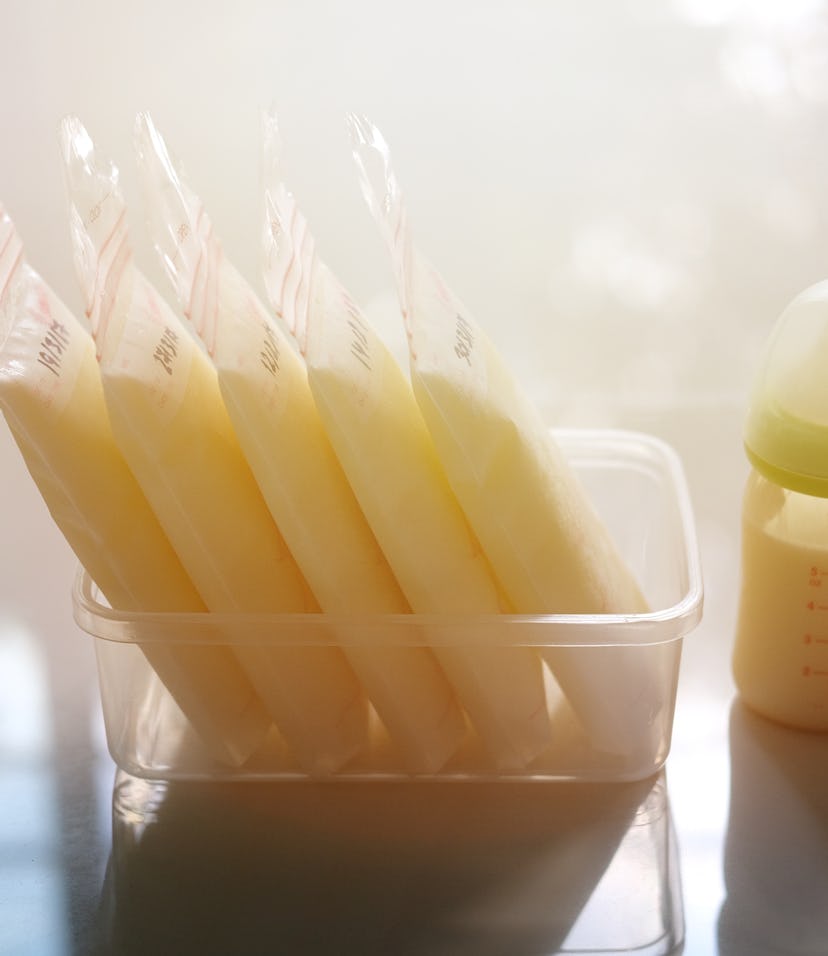Breastfeeding

Here’s What Experts Say About Microwaved Breast Milk
What do you do if your little prefers their liquid gold to not be liquid cold?
As someone who had a hard time getting her son to latch, I ended up exclusively pumping, hoping that would be a little easier for everyone. But pumping led to even more questions. How long do I pump breast milk? How often should I pump breast milk for my baby? And then there’s the thawing of the frozen stash and the warming of the thawed or refrigerated stash. Warming up breast milk sounds easy in a microwave, but microwaved breast milk may not be the best choice for your baby.
Can Breast Milk Be Microwaved?
For the 3 a.m. feeds, as I was pulling out my son’s milk from the fridge, I definitely toyed with the idea of popping it into the microwave quick so I could get back to sleeping faster. Thankfully I didn’t do this, because according to Hali Shields, a doula with New Kind who has extensive experience and certifications in lactation, it’s not a good idea to microwave your baby’s breast milk — not only for your baby’s safety, but it can alter the amazing chemical makeup of the milk that is good for your baby. “According to the American Academy of Pediatrics and Centers for Disease Control, using a microwave to heat infant milk or foods is not recommended,” she says. “Microwaves heat unevenly, causing hot spots that can easily scald a baby.”
She also adds that human milk is considered a “living substance.” And if you heat the breast milk in the microwave it can destroy many of the living cells. “Overheating has also been shown to decrease the fat content and denature the milk proteins,” she says.
How To Incorporate Breast Milk In Baby’s Food Safely
When my son was initially beginning to eat solid foods, I’d mix my pumped breast milk with that baby oatmeal from Gerber and he’d scarf it down. Being afraid to microwave my milk, I’d have to get up early and pump so my milk would be warm for the oatmeal. Was this pain in the butt worth it? Apparently so, according to Shields. “While many parents choose to start with cereal, it's not a good idea to warm the oatmeal up in a microwave,” she says. “Since human milk is filled with immunological and anti-inflammatory properties, as well as white blood cells, digestive enzymes, and probiotic bacteria, overheating has been shown to destroy most of these properties.”
Thankfully, most babies will eat cereals and solid foods at room temperature so it's not required to heat foods before you offer them to your little one, Shields says.
Additionally, Krystyn Parks, a pediatric registered dietitian, certified breastfeeding specialist, and founder of Feeding Made Easy, tells Romper, “Freshly pumped breast milk is OK at room temperature for four hours, so if the parent is pumping and planning on feeding very soon, they can just keep the bottle at room temperature and serve it that way.”
Safe Ways To Warm Breast Milk
Parks says she recommends using a bottle warmer or placing the pumped milk into a bottle and placing the bottle in warm water to warm it up. Shields says, “Simply fill a bowl or mug with warm (not hot) water and place the bottle of milk inside until the bottle comes to a lukewarm temperature. You can also hold the bottle of milk under the faucet.”
To make sure the faucet water isn’t too hot, Shields says, “Always check the temperature with your wrist to make sure it's not hot. It should be comfortable to hold your hand under the faucet. If you have to pull your hand away, it's too hot.”
Bottom line? To ensure you don’t scald your baby and be 100% sure they’re getting all of those amazing nutrients from all of your hard work, use a bottle warmer or place the bottle under warm water from a faucet to warm that liquid gold rather than microwaving your breast milk.
Experts:
Hali Shields, a doula with New Kind who has extensive experience and certifications in lactation.
Krystyn Parks, pediatric registered dietitian, certified breastfeeding specialist and founder of Feeding Made Easy.
This article was originally published on